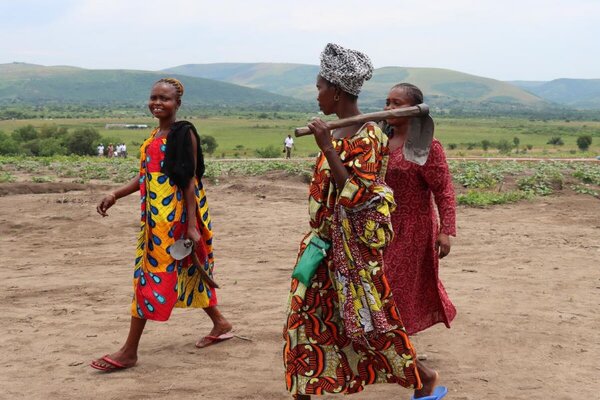Women and girls the key to unlocking DRC's future, says WFP Chief on International Women's Day

Executive Director McCain is in DRC where she visited a farm in N’sele, near Kinshasa. The WFP chief met women who have benefited from WFP programmes that promote financial inclusion and agricultural skills training, and witnessed how providing support directly to women and girls means that they are not forced into dangerous situations that leave them vulnerable to violence, exploitation, and sexual abuse. Many women told the Executive Director that taking a step towards financial independence through these programmes has also given them the chance to provide their children with a better education.
“Humanitarian assistance must keep pace with the rapidly growing needs in eastern DRC. While this conflict continues, emergency relief will remain absolutely critical,” said the Executive Director, speaking from Kinshasa. “But we also must not ignore the incredible role of women in shaping this nation’s future. Investing in women and girls isn’t only about meeting urgent humanitarian needs – it’s a strategic commitment to sustainable development and national resilience.”
The resurgence of conflict in eastern provinces of DRC has displaced over one million people in just the last few months, causing a massive influx of people into overcrowded camps and leading to food shortages and increased commodity prices in Goma's markets.
When food becomes scarce, women are forced to make agonizing choices, sacrificing their own nutrition to ensure that their children have enough to eat. This cycle of deprivation not only perpetuates the cycle of poverty but also undermines the resilience of entire communities.
A staggering 1.7 million pregnant and breastfeeding women and girls in the DRC suffer from acute malnutrition, putting both their lives at risk and those of their children. The people, including women, in needing nutrition assistance is projected to increase from 6.4 million to 8.4 million in 2024.
“Achieving sustainable solutions to hunger depends on making lasting advances in gender equality worldwide. This is crystal clear in the Democratic Republic of the Congo, where it is not only a matter of human rights – it is also fundamental to achieving peace and prosperity for the country,” said Executive Director McCain. “Investing in women creates a powerful ripple effect, strengthening communities and nurturing the next generation of leaders.”
Notes for the editor:
Photos are available here
# # #
The United Nations World Food Programme is the world’s largest humanitarian organization saving lives in emergencies and using food assistance to build a pathway to peace, stability and prosperity for people recovering from conflict, disasters and the impact of climate change.
Follow us on Twitter @wfp_media add your local Twitter handle, if relevant
Topics
Democratic Republic of the Congo Gender equality Food security EmergenciesContact
For more information please contact (email address: firstname.lastname@wfp.org):
Shelley Thakral, WFP/Kinshasa,
M. +243 81 700 674
Tomson Phiri, WFP/Johannesburg,
M. +27 810 263 792
Annabel Symington, WFP/Rome,
M. +39 342 188 4921
